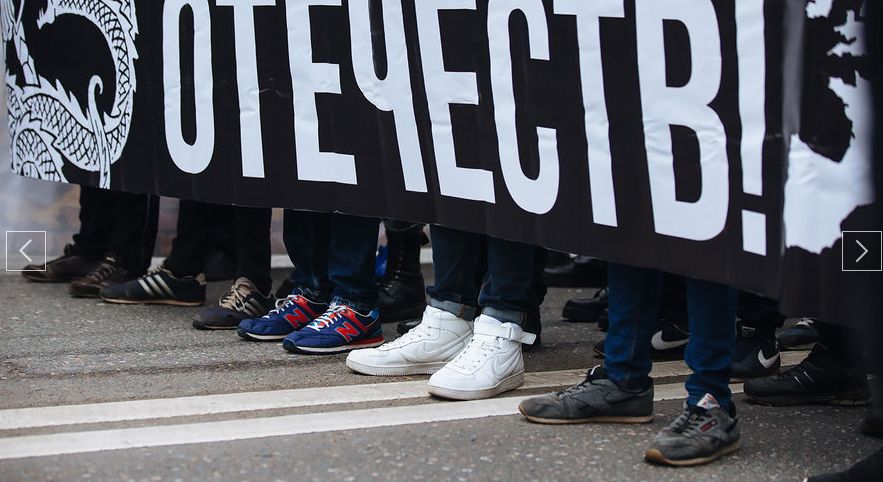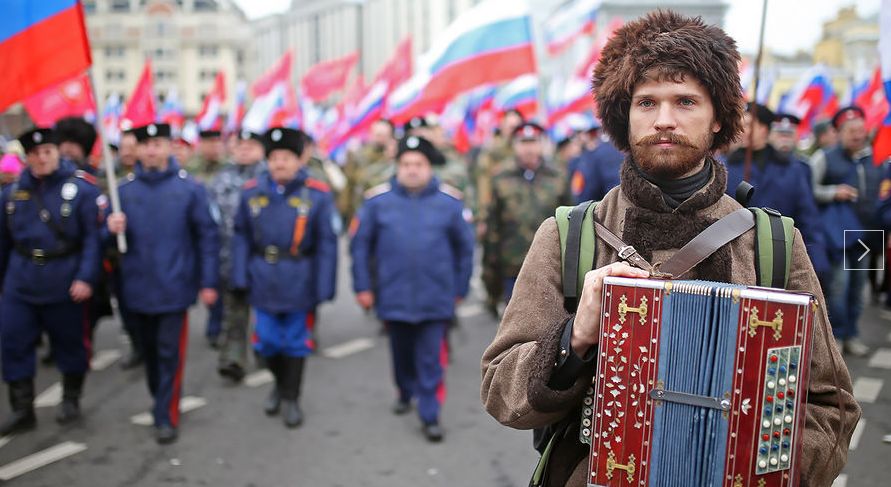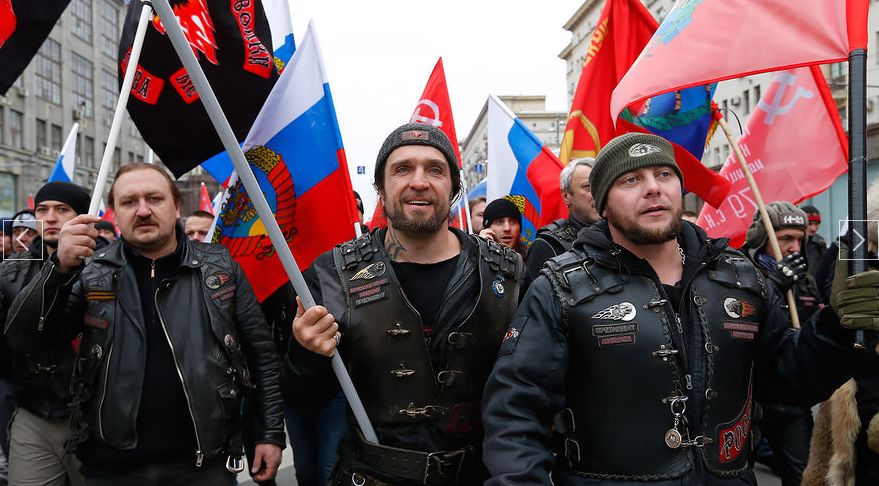Russian businessman Aleksandr Grigoryev has been detained on suspicions of money-laundering $1.6 million from banks that lost their licenses, and could be involved in as much as $46 billion, Moscow Times reported, citing Kommersant.
Welcome to our column, Russia Update, where we will be closely following day-to-day developments in Russia, including the Russian government’s foreign and domestic policies.
The previous issue is here.
Recent Translations:
–The Non-Hybrid War
–Kashin Explains His ‘Letter to Leaders’ on ‘Fontanka Office’
–TV Rain Interviews Volunteer Fighter Back from Donbass
–‘I Was on Active Duty’: Interview with Captured GRU Officer Aleksandrov
UPDATES BELOW
This week, Interpreter’s managing editor James Miller and Boston College professor Matt Sienkiewicz are joined by The Interpreter’s Pierre Vaux
to discuss internet trolls and Russian propaganda. In particular, we
discuss Kremlin-run “troll farms” which attempt to influence, and
ultimately distort, the narrative surrounding world events.
Listen to it below, or click hear to listen to it in a new tab:
The annual march of Russian nationalists for “Unity Day” has begun today in Lyublino, a suburb of Moscow, with an estimated 2,000 people — far fewer participants than the state-run action created to coopt it, a march in the center of Moscow that has drawn 85,000, the Russian media reported.
Two “Russian March” organizers have already been detained. This morning November 4, police approached Anton Smirnov, one of the organizers, at the start of the march and asked him to come with them to sign some papers, Gazeta.ru reported. He was then arrested and his current location is not known, said another organizer, Dmitry Dyomushkin.
Dyomushkin himself was detained on November 3, Kommersant reported, and complained that it was politically motivated to derail his participation in the march.
Yet another organizer, Yury Gorsky, was twice detained on October 30. Under Russian law, if a person is twice charged for an administrative offensive, he cannot be issued a permit to demonstrate.
On October 28, the Moscow City Court ruled that the movement Russkiye [ethnic Russians] was extremist and banned its activity in Russia. Dyomushkin announced that he would contest the court decision, but nevertheless said his group was disbanding.
Despite the court ruling and the detentions, the march went ahead today. Gazeta.ru estimated about 1,500-2,000 participants, a steep decrease compared to past years. In 2013, we reported 5,000 took part, and as many as 10,000 in past years. Participants say that the official parade was designed to hijack and tame their supporters, and that the FSB has recruited informants to sabotage them.
Particpants wore ushanki, Russian fur hats with ear flaps and carried nationalist signs, although less militant than in past years, possibly in light of the court ruling.
Translation: Nationalists in “ushanki” conduct the “Russian March” outside of Moscow.
Artyom Sizov of Gazeta.ru captured some protesters bearing a sign with
the word “Fatherland” in large letters, but wearing sneakers that were
likely manufactured abroad; one says “NY” in the colors of the Mets.
Just
as last year, there were some in the Russian March in Lyublino
protesting the war in Ukraine. “DNR, Burn in Flames!” chanted some
marchers who opposed the self-proclaimed “Donetsk People’s Republic”
(DNR). Others protested unpaid or low pages. Black Bloc members were
also visible. While some of these might be counter-demonstrators,
Gazeta.ru said that during the organized speeches, people also opposed
the wars in Ukraine and Syria as harmful to Russia and cursed the
“Kremlin puppets” in the State Duma — they were indistinguishable from
some “white ribbon” rallies of the liberal opposition, said Gazeta.ru.
Meanwhile,
in the center of Moscow, approved demonstrators took part in a march
along Tverskaya Street, some playing folk songs on accordians.
Photo by Sergei Bobylyov/TASS
Aleksandr
Zaldostanov, known as “Surgeon,” the head of the Night Wolves bikers’
club endorsed by President Vladimir Putin, was among the nationalist
celebrities at the march.
Photo by Mikhail Dzhaparidze/TASS
Vladimir Zhirinovsky of the ill-named Liberal
Democratic Party of Russia was also present, as were Sergei Mironov,
head of the Just Russia faction in parliament and Gennady Zyuganov, head
of the Communist Party of the Russian Federation. A mother and her nine
children from the Crimea were brought on stage, along with a teacher
from a school in Simferopol and a Rostov farmer to speak about
“prosperity in unity.”
Gazeta.ru commented (translation by The Interpreter) about the official march:
The
demonstrators walked along Tverskaya Street from the Pushkinskaya metro
stop to the Okhotny Ryad metro stop, where a rally and concert took
place.What struck the eye was the large number of young people
of the age of freshmen university students. A number of them belong to
youth organizations and said they were “organized” for the rally. “We
are for everything good against everything bad,” said one young man who
represented a monarchist youth organization called Georgievets. He was
wearing a yellow cape testifying to the fact that he was a member of
this organization.Another marcher told Gazeta.ru he was from
the trade union committee of a Moscow university. Periodically, the
young people looked for their leaders — apparently in order not to get
lost in the crowd.
Signs at the march called for the Prosecutor
General to investigate the “coup d’etat of 1991” (by which they mean
Yeltsin’s coming to power) and also ensure that Putin had the authority
to “purge the traitors in the government.”
While National Unity
day has a decidedly Russian cast, the propaganda around it emphasizes the
unity and sense of national purpose of Russia’s “200 nationalities” or
diverse ethnic groups. Speeches at the rally invoked the sense that
Russia is surrounded by enemies, notably due to Western sanctions
imposed because of Russia’s annexation of the Crimea. “The more the
pressure, the stronger the concrete” said singer Oleg Gazmanov.
For more photos see Gazeta.ru’s slide show
— Catherine A. Fitzpatrick
Russian businessman Aleksandr Grigoryev has been detained on suspicions of money-laundering $1.6 million from banks that lost their licenses, and could be involved in as much as $46 billion, Moscow Times reported, citing Kommersant.
Grigoryev — the co-owner of several banks, including the failed Zapadny
and Doninvest banks — was detained Friday in a central Moscow restaurant
where he was dining with his girlfriend, the report said.The
44-year-old entrepreneur was denied bail and is being held in detention
on two counts of fraud involving a sum of 105 million rubles ($1.6
million), Kommersant reported.Investigators also suspect
Grigoryev, who was at one time vice president of the Moscow Boxing
Federation, of leading one of Russia’s largest organized crime groups,
involving around 60 banks and more than 500 people, the report said.
In the past four years, the ring could have sluiced more than $46
billion abroad through the banks — some of which are partly state owned
and some of which were declared bankrupt after Grigoryev became
co-owner, the report said.
Kommersant
reported that after he was arrested and law-enforcers had sat Grigoryev
down at the table, they asked if he didn’t want to return the money
voluntarily. But he said he didn’t have the cash and knew nothing about
it. Earlier he had asked to be released on bail and said he had 105
million rubles ($1.6 million) he could put up for the bail — which
happens to be the amount of the damages sought from him now.
Police
in Rostov region have been investigating the case since last April.
They say that when Doninvest lost its license, Grigoryev was given “shadow
control” over the finances. Then he and two accomplices, Alla
Kalitvanskaya and her deputy Svetlana Gulenovay, allegedly organized the
removal of more than a billion rubles ($16 million) from the bank into
groups controlled by their companies, and concluded fictitious real
estate deals in the Crimea totaling more than 150 million rubles ($2.4
million).
Why Grigoryev is only charged with $1.6 million now, given these other deals, is a mystery.
Grigoryev’s capers were organized through fictitious
offshore companies involving citizens of Moldova. In one scheme, parties
to a contract would sue the firms for non-fullfulment in Moldovan courts
and the courts would order damages to be paid to Grigoryev’s account.
According to Moldovan law-enforcement involved in combating
money-laundering, this type of scheme has led to $18.5 billion in
settlements, which were only a cover for withdrawing cash.
Grigoryev
denies the charges, although before his arrest, he had learned about a
possible case against him and reportedly paid a “fixer” 300 million
rubles ($4.8 million) to “make it go away.” Just days before his arrest,
the fixer had reassured Grigoryev that everything was fine.
Grigoryev’s
case involving the three banks that lost their license is not even the
main interest of the authorities, says Kommersant. Grigoryev was
involved in high-risk loans and junk assets as well as getting cash out
of Russia. But what’s more serious, despite these staggering sums, is
Grigoryev’s role as the leader of the large organized crime network of 500 people involved in obnalichka, a slang term which grew popular in
Russia during the 1990s for fake deals involving unreported cash and
avoidance of taxes.
According to Kommersant, this network involving 60 banks was said to turn over 1 trillion rubles
($16 billion) annually, and which reportedly took out about $46 billion
from Russia in the last 4 years. Some of these banks have already lost
their licenses.
— Catherine A. Fitzpatrick
A blogger in Bashkortostan, a southern republic of the Russian Federation, has been sentenced to three years of strict-regimen labor camp for publishing an article deemed “extremist.”
The Moscow District Military Circuit Court declared Robert Zagreyev guilty of “public justification of terrorist activity” for publishing a piece by the Bashkir activist Ayrat Dilmukhametov defined by law-enforcers as containing “calls for a violent, armed revolutionary change of the constitutional order in Russia and creation of a separate ‘Bashkurdistan’ state,” Human Rights in Russia reported.
Zagryeyev, a 51-year-old historian published the article in the fall of 2012, and the prosecutor opened a case six months later. In March 2015, Dilmukhametov was sentenced himself to three years of imprisonment for “public calls to terrorism.” Zagreyev, the administrator of the site where the article was published, was dealt with in a separate case.
According to the Sova Information Center, which tracks extremism in Russia, Zagryev was detained April 25, 2015 by officers of the Ufa branch of the FSB. Zagreyev pleaded not guilty, saying he had not posted the article on his site. On his own blog, he wrote that his case seemed have been especially ordered by authorities as a show trial.
His lawyer Vsevolod Lebedintsev denied that the articles of both Zagreyev and Dilmukhametov contained incitement of violence, and said the essay was a political description of a possible future outcome in Russia, and was a warning of what was to come.
— Catherine A. Fitzpatrick


